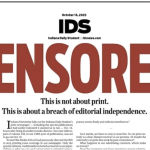About News
Writers Are Going Through a Bad Spell

Three winning words in the annual Scripps National Spelling Bee, which wraps up Thursday night, were “abseil,” “psammophile” and “moorhen.” Did I mention that it’s for ages eight to 14?
I’m still working on “embarrassed.”
As impressive as these kids will be, they don’t represent what’s happening out there among writers of any age. It’s dismal. I say this based on grading journalism assignments from hundreds of college students from high schools all over the U.S., as well as on just reading a lot of stuff written by older adults in the real world. I couldn’t find any stats that tested spelling skills apart from writing proficiency, but others agree bad spelling is a problem.
Why? A 2021 academic article reported: “In the early 21st century, skepticism as to the importance of spelling has grown, some schools have deemphasized or abandoned spelling instruction altogether, and there has been a proliferation of non-traditional approaches to teaching spelling.”
The anything-goes format of social media and the shortcut of using AI are also to blame for writers not learning how to spell. Spell checking programs that identify errors and require manual correction are fine; those that employ auto correct are not.
Then there’s this: The English language is loaded with snakes and traps.
Here, as I see it, are some categories of words that make spelling hard. Some of this is borderline unfair.
Words that require knowing whether to use one or two of a letter – in two places. “Vacuum” is one “c” and two u’s. “Occasion” is two c’s and one “s.” It took me years to learn “harass.” And just to save myself time, I refuse to be friends with anyone from Cincinnati.
Words that sound the same but are spelled differently depending on meaning. “Complimentary” and “complementary,” “reign” and “rein,” “mantle” and “mantel,” to name just three of many. “Everyday” and “every day” belong here, too. These don’t sound exactly the same but I consider “affect” and “effect” the kings of this category. To make matters worse, there are two definitions of “affect” and two of “effect.” That’s just plain mean.
Words with silent letters, such as “subtle” and “receipt.” Thank you for nothing, “b” and “p.”
Words that don’t conform to normal rules. So where’s the vowel in “rhythm,” eh?
Words with too many vowels. There is no one on earth who can spell “acquiesce” or “hors d’oeuvres” without looking them up.
Words you spell wrong because you’ve heard them wrong so many times. Listening to people talk, it’s hard to blame anyone who writes “sophmore.” Or “seperate.” Or “seprate.” Or who writes a term paper on the “Klu Klux Klan.” (OK, if it’s a term paper, you really ought to catch that one.)

Illogical traps. It makes 100% sense for the word to be “miniscule.” Because it’s something small, right? But nooo. Someone had to make it “minuscule” just to torture us. Why isn’t a fake name a “pseudoname”? Maybe it was a New York Mets fan who made it “pseudonym.” One who writes plays is a “playwright.” That shouldn’t be right. One who owns a restaurant is a “restaurateur,” not a “restauranteur.” That annoys me to the nth degree.
I have now written this whole post and commendably resisted the temptation to use the tired gimmick of intentionally misspelling a word for humor. I just didn’t think it was neccesary.
 Tom Arenberg is an instructor of news media at the University of Alabama. He worked for The Birmingham News and the Alabama Media Group for 30 years. He published this commentary originally as a post on his blog, The Arenblog.
Tom Arenberg is an instructor of news media at the University of Alabama. He worked for The Birmingham News and the Alabama Media Group for 30 years. He published this commentary originally as a post on his blog, The Arenblog.
About News is a BirminghamWatch feature that publishes commentary by those who teach the craft and think about the values and performance of today’s journalism. BirminghamWatch also publishes About News articles on Facebook and invites readers to join the conversation there.


